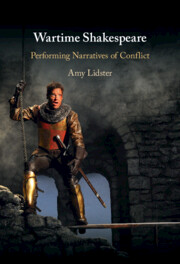Book contents
- Wartime Shakespeare
- Wartime Shakespeare
- Copyright page
- Dedication
- Contents
- Figures
- Acknowledgements
- Note on the Text
- Introduction
- Part I
- Part II
- Chapter 4 Fragmenting Shakespeare(s) and the First World War (1914–18)
- Chapter 5 ‘What We Are Fighting For’
- Chapter 6 ‘Anti-War’ Shakespeare
- Conclusion
- Select Bibliography
- Index
Chapter 6 - ‘Anti-War’ Shakespeare
Just War Theory, Sponsorship, and the Impact of Theatre during the Iraq War (2003–11)
from Part II
Published online by Cambridge University Press: 12 October 2023
- Wartime Shakespeare
- Wartime Shakespeare
- Copyright page
- Dedication
- Contents
- Figures
- Acknowledgements
- Note on the Text
- Introduction
- Part I
- Part II
- Chapter 4 Fragmenting Shakespeare(s) and the First World War (1914–18)
- Chapter 5 ‘What We Are Fighting For’
- Chapter 6 ‘Anti-War’ Shakespeare
- Conclusion
- Select Bibliography
- Index
Summary
Chapter 6 concentrates on the Iraq War (2003–11) and a resurging critical interest in just war theory, reflected also in the design and reception of Shakespearean productions. Global public protests preceded the coalition invasion, led by the United States and Britain, of Iraq in March 2003, and the arts, including theatre, provided platforms for voicing this opposition. Chapter 6 adopts just war theory as its organizing principle: the first part considers the justification of conflict (jus ad bellum) as it is critiqued in Nicholas Hytner’s Henry V (2003); the second part examines the violation of just conduct during conflict (jus in bello) as explored within Roy Williams’s Days of Significance (2007) and Sulayman Al Bassam’s Richard III: An Arab Tragedy (2007); the final part considers the end of conflict (jus post bellum), the relevance of the term ‘post-war’, and the erasure of Western wartime responsibility through an analysis of Monadhil Daood’s Romeo and Juliet in Baghdad (2012). This chapter argues that these productions, similar to contemporary Iraq War literature, are sceptical of conflict resolution and closure, but that other production and reception conditions shift their interpretative currency through structures of arts sponsorship and the political and cultural views brought to the theatre, all of which qualify the labelling of these productions as ‘anti-war’.
Keywords
- Type
- Chapter
- Information
- Wartime ShakespearePerforming Narratives of Conflict, pp. 238 - 275Publisher: Cambridge University PressPrint publication year: 2023

